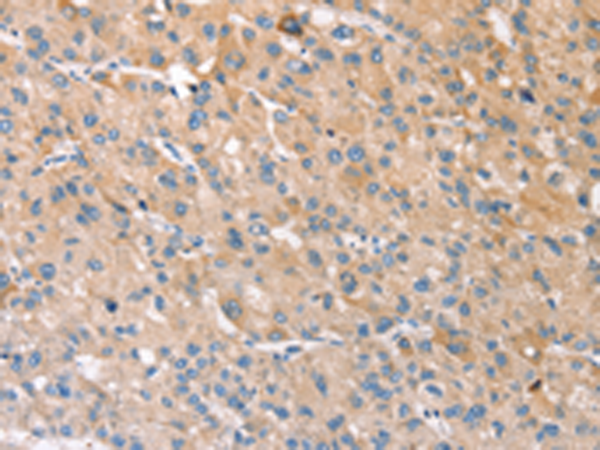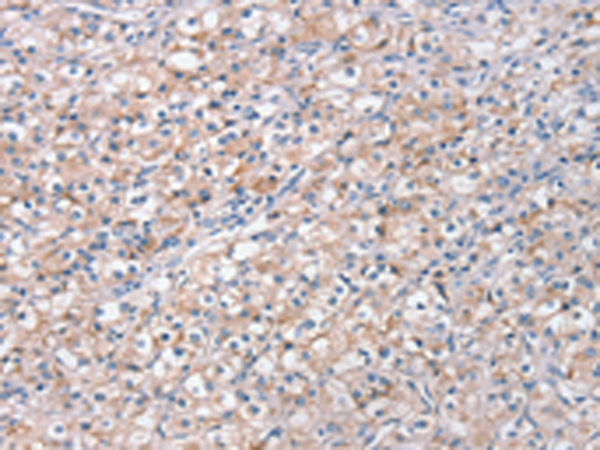


| WB | 1/500-1/2000 | Human,Mouse,Rat |
| IF | 咨询技术 | Human,Mouse,Rat |
| IHC | 1/25-1/100 | Human,Mouse,Rat |
| ICC | 技术咨询 | Human,Mouse,Rat |
| FCM | 咨询技术 | Human,Mouse,Rat |
| Elisa | 1/2000-1/5000 | Human,Mouse,Rat |
| Aliases | KRCT; MPSK; TSF1; PKL12 |
| WB Predicted band size | 35 kDa |
| Host/Isotype | Rabbit IgG |
| Antibody Type | Primary antibody |
| Storage | Store at 4°C short term. Aliquot and store at -20°C long term. Avoid freeze/thaw cycles. |
| Species Reactivity | Human, Mouse, Rat |
| Immunogen | Fusion protein of human STK16 |
| Formulation | Purified antibody in PBS with 0.05% sodium azide and 50% glycerol. |
+ +
以下是关于STK16抗体的3篇参考文献,包含文献名称、作者及摘要内容概括:
---
1. **文献名称**:*Characterization of STK16 (MPSK1) Kinase Activity and Its Role in Cell Proliferation*
**作者**:Yokota, T., et al. (2005)
**摘要内容**:该研究开发并验证了一种特异性识别STK16蛋白的多克隆抗体,用于分析其激酶活性及在细胞增殖中的作用。通过Western blot和免疫沉淀实验,发现STK16通过磷酸化特定底物调控细胞周期进程。
2. **文献名称**:*STK16 Regulates Golgi Membrane Dynamics and Cargo Secretion*
**作者**:Ben Salem, S., et al. (2012)
**摘要内容**:研究利用STK16特异性抗体进行免疫荧光定位,发现STK16定位于高尔基体,并参与调控膜运输和分泌途径。抗体阻断实验表明STK16磷酸化缺陷会破坏高尔基体结构,影响蛋白质分泌。
3. **文献名称**:*STK16 Expression Correlates with Poor Prognosis in Gastric Cancer*
**作者**:Zheng, H., et al. (2018)
**摘要内容**:通过免疫组化分析胃癌组织样本,发现STK16蛋白高表达与患者不良预后相关。研究使用商业化STK16抗体验证其作为潜在肿瘤标志物的价值,并探讨其促癌机制。
---
以上文献均涉及STK16抗体的应用(如检测、定位或功能研究),涵盖基础机制探索与临床相关性分析。如需具体文章链接或补充信息,可进一步提供数据库检索关键词(如PubMed ID)。
The STK16 antibody is a tool used to study the serine/threonine kinase 16 (STK16), also known as MPSK1 or CRIK. STK16 belongs to the mammalian STE20-like kinase family and is involved in various cellular processes, including cell cycle regulation, cytokinesis, and membrane trafficking. Its structure features an N-terminal kinase domain and a C-terminal regulatory region, which may mediate protein interactions or subcellular localization. STK16 activity is modulated by auto-phosphorylation and binding partners, though its precise regulatory mechanisms remain incompletely understood.
Antibodies targeting STK16 enable researchers to detect its expression, localization, and functional roles in biological systems. These antibodies are widely utilized in techniques such as Western blotting, immunoprecipitation, and immunohistochemistry. Due to potential variability in specificity and affinity, validation using knockout controls or orthogonal methods is recommended. Studies employing STK16 antibodies have linked the kinase to cancer progression (e.g., aberrant cell proliferation) and neurodegenerative disorders, suggesting its involvement in disease-related signaling pathways.
Challenges in STK16 research include its low abundance in certain tissues and cross-reactivity risks with structurally similar kinases. Additionally, post-translational modifications may affect antibody binding. Despite these hurdles, STK16 antibodies remain critical for unraveling the kinase's physiological and pathological roles, with implications for developing targeted therapies. Ongoing efforts aim to refine antibody specificity and explore STK16's interaction networks to clarify its mechanistic contributions to cellular homeostasis and disease.
×